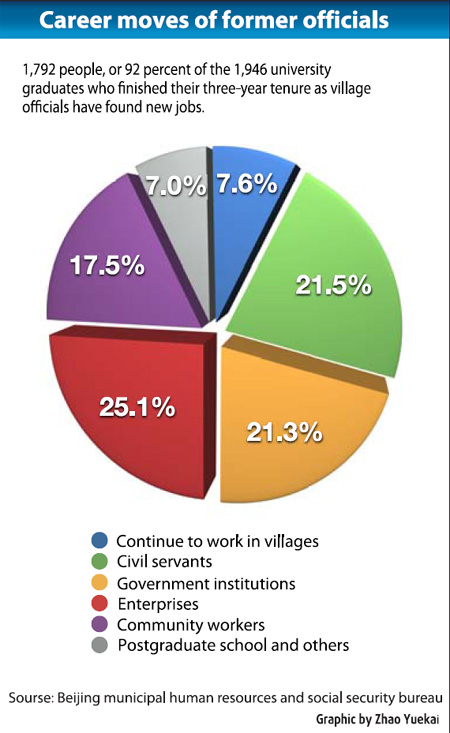Education
Graduate unfulfilled by village work
By Qin Zhongwei and Meng Jing (China Daily)
Updated: 2009-12-15 09:59
 |
Large Medium Small |
|
 University graduate Tong Kejia, who works as a village official in Yanqing county, helps locals grow watermelons. [China Daily/Liu Ping] |
Zou Liang (not his real name), 28, a law major from a university in Beijing was among the first batch of about 2,000 college graduates that participated in the program in 2006.
The graduate, who worked in a village in Changping district, has now taken a job at a local bank, which advertised 50 exclusive positions for the former village cadres.
Zou said the program had made him more mature, but he did not feel he made much of an impact.
"I really wanted to do something before I went to the countryside," he said.
"I believe most of us who made the same decision all shared some heroic dreams, like reducing the poverty of the village.
But most of the time, Zou said he just did paperwork, wrote reports and drafted documents.
"I cannot recall any big achievements I made," he said. "There are good examples about some college graduates helping villagers to sell their apples or walnuts successfully, but only 10 percent can do that. What most of us do is just try to be a good secretary."
Under the three-year program, which ended in July, village cadres were paid about 2,000 yuan per month. The salary rose by 500 yuan in later years.
Of the 1,792 people who have got new jobs, 137 chose to renew their contacts with the villages.
The survey was conducted among university graduates who worked in more than 190 villages across the country between Nov 2008 and Jan 2009.
Hu Yuegao, the professor who wrote the report, said the program is in development and there are still many aspects that need to be improved.
Hu suggested that a village cadre internship be introduced into the program. "Quite a few college students have never had the experience of working or living in the village before," said Hu.
"They should be offered an internship in a village before they make their decision. So they can be certain that this is something they really want to do."
Hu also said that applicants should be given a clear job description: "So that they know what they should achieve in three years," he explained.
Meanwhile, Zou said that his job at the bank would have been impossible without his experience as a village cadre. "Without the village cadre background, it would have been impossible," he said.
Zou said there are new things to learn and new relationships to develop every day, but his experience as a village cadre trained him to be "easygoing, self-motivated, down to earth and patient".
Meanwhile, An Yi, a village officer in Changping district, chose to continue to work in village.
According to him, there are some unwritten rules involved in village work but most university graduates cannot cope because they lack social experience.
"Sometimes communication problems do exist between us and the heads of villages," An said.
Another village cadre who studied computer science in college said her major was not useful in her daily work, except when using Excel or Word.
"I am afraid I will forget everything I learned when I leave here," said the woman who asked not to be named.















